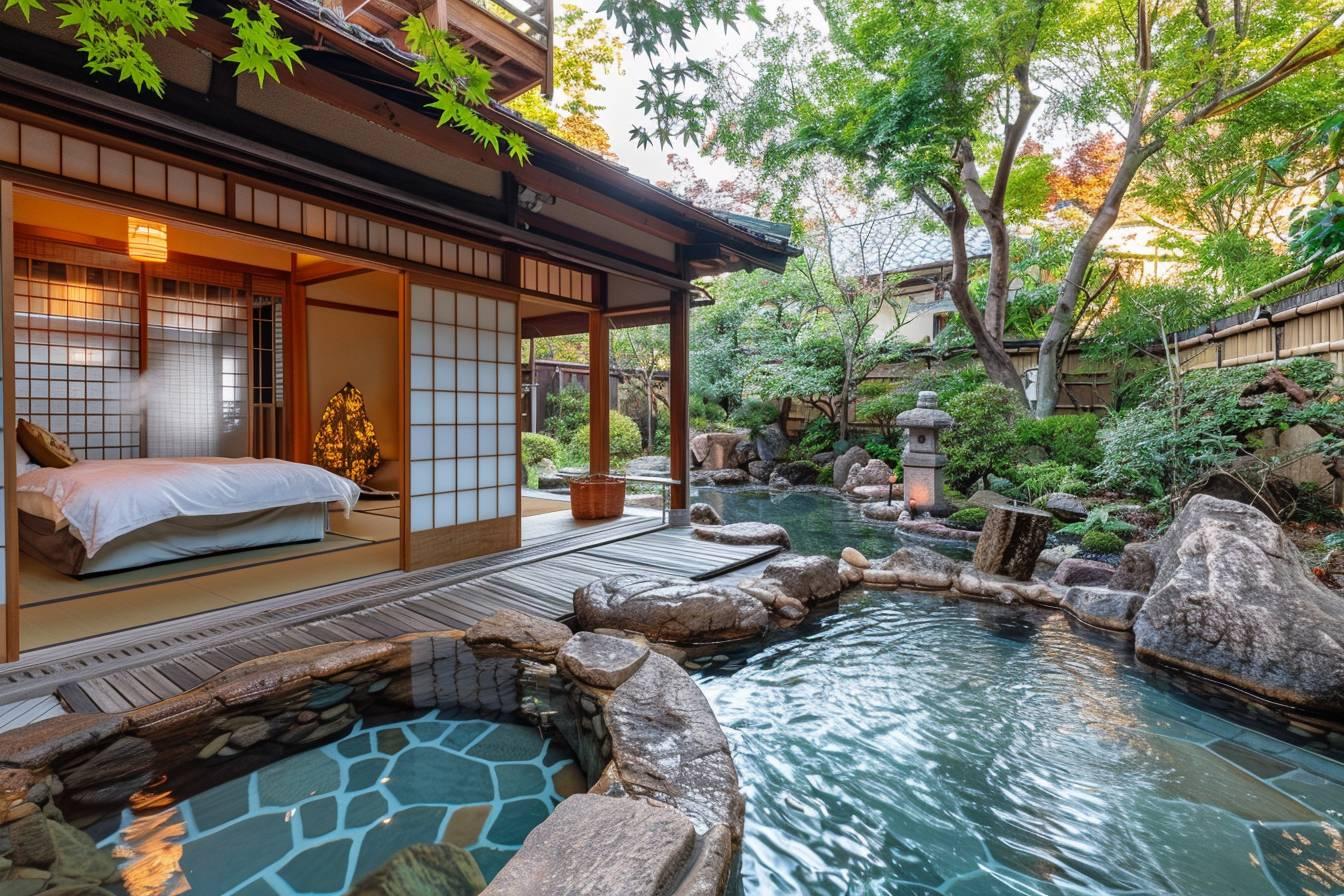Exploring Japan offers a spectrum of accommodation experiences that cater to diverse tastes and budgets.
From the traditional grandeur of luxury Ryokans to the compact efficiency of capsule hotels, the Land of the Rising Sun blends tradition and innovation in its hospitality offerings.
In this exploration, we’ll delve into the nuances of Japan’s unique accommodations, ensuring travelers can make informed choices based on their personal preferences and budgetary considerations.
In this article
Embracing tradition in luxury Ryokans with Onsen
One cannot discuss Japanese accommodations without spotlighting the classic Ryokan. These traditional Japanese inns offer more than just a place to sleep; they provide a deeply immersive cultural experience.
Ryokans typically feature tatami mat floors, futon beds, and communal spaces where guests can don yukata (casual kimono) and mingle.
However, The highlight for many is the inclusion of an onsen (hot spring bath), a quintessential Japanese experience rooted back to centuries of tradition. These thermal baths, often mineral-rich and naturally heated, promise relaxation and a unique serenity amidst Japan’s breathtaking landscapes.
However, it’s essential to note the etiquette accompanying onsen usage, emphasizing cleanliness and respect for fellow bathers.
As an avid trekker and digital nomad, I’ve found the onsen ritual to be a perfect antithesis to a day spent exploring rugged terrains or hunched over my laptop.
On one memorable occasion, while staying at a ryokan in Hakone, the soothing embrace of the onsen under a starlit sky was nothing short of magical. It was a massive contrast to the bustling cityscapes of Tokyo, where my journey had begun.
The quintessential experience of Capsule Hotels
Capsule hotels, a concept originating in Japan in the late 1970s, have evolved from simple accommodations for businessmen to attractions themselves, drawing curiosity and interest from global travelers.
These futuristic pods offer a minimalist’s dream: a compact yet comfortable private space with essential amenities like Wi-Fi, electrical outlets, and sometimes even a small TV.
Capsule hotels do not deprioritize cleanliness and safety despite their size, offering a unique and efficient accommodation option, particularly in urban areas.
Capsules may be small, but they punch in convenience and cost-effectiveness. Located near major train stations and city centers, they make exploring Japan’s urban landscapes easy and affordable.
The communal areas often become social hubs where travelers can share stories and tips.
However, it’s essential to be mindful of others in such close quarters and respect silence and privacy.
During one stay in Osaka, I marveled at the seamless blend of solitude within my capsule and the vibrant interaction beyond its thin walls, a testament to Japan’s expertise in harmonizing individual and communal needs.

High-end and hip: boutique hotels in trendy neighborhoods
Tokyo and Osaka’s bustling neighborhoods are home to some of the most stylish boutique hotels, offering a stark contrast to traditional ryokans and minimalist capsule hotels.
These establishments often reflect their surroundings’ artistic and creative pulse, offering bespoke experiences and interiors crafted by renowned designers.
Boutique hotels in areas like Shibuya or Shinjuku are not just about luxury accommodations; they are about immersing oneself in the local scene, often a short walk from cutting-edge galleries, upscale cafes, and hidden speakeasies.
On a personal note, staying in a boutique hotel in Tokyo’s Harajuku district was like having a finger on the pulse of Japan’s youth culture.
From the moment I stepped out, I was engulfed in the place’s energy. I was surrounded by high fashion, pop art, and the melding of traditional Japanese elements with avant-garde expression.
It was an enlightening experience beyond mere accommodation, offering cultural insights and inspirations that later colored my work and personal reflections.
Shared apartments: the social traveler’s choice
Shared apartments offer an excellent solution for travelers keen on interaction and longer stays. These accommodations often have private rooms but share common areas like kitchens and living rooms, fostering a sense of community among travelers.
This setup caters well to the remote worker or digital nomad, offering space for focus and opportunities for networking and friendship.
Reflecting on my travels, I have often found that time spent in shared apartments has led to some of the most enriching interactions and exchanges.
In Kyoto, a shared meal transformed into an impromptu coding workshop, bridging cultures and skills and forging connections that lasted well beyond my stay. These moments of genuine connection underscore the value of choosing accommodations that align with one’s travel ethos and objectives.
Japan’s accommodations cater to every type of traveler, blending traditional and modern elements to create unique experiences.
From the serene luxury of Ryokans with their healing onsens to the futuristic convenience of capsule hotels, from the stylish environs of boutique hotels to the communal spirit of shared apartments, Japan offers a rich tapestry of choices.
As travelers, we select the accommodations that best align with our preferences, ensuring a journey as enriching as the destinations we explore.




